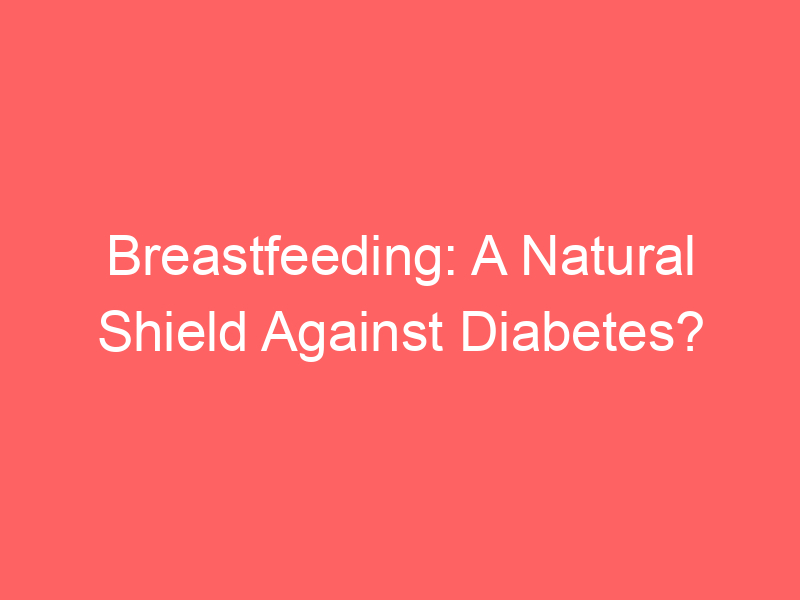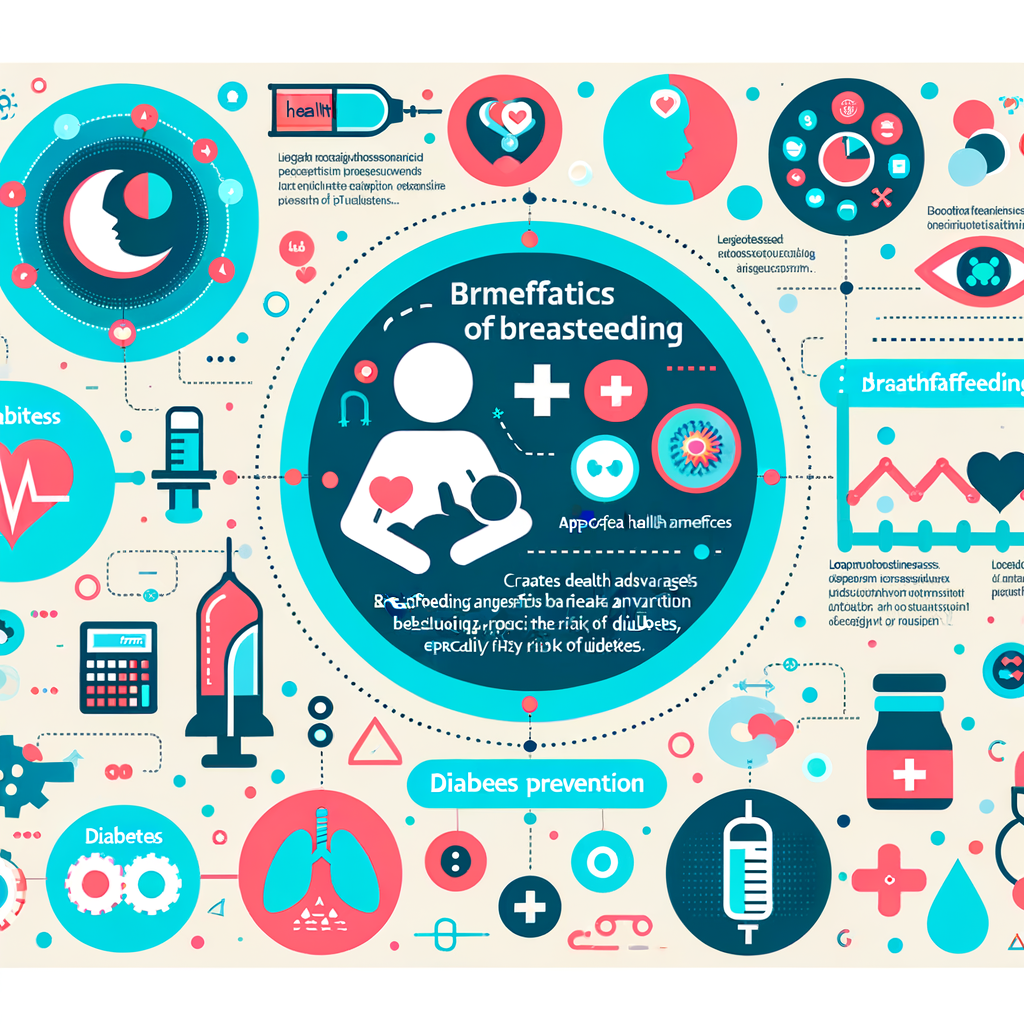Introduction: Breastfeeding and Health
When a baby is born, one of the first decisions a new parent makes is how to feed their child. Breastfeeding, a natural process, has been a part of human life for thousands of years. It is not just a meal for a baby; it’s a powerful way to promote health and wellbeing. In this article, we will explore the importance and health benefits of breastfeeding.
-
- The Importance of Breastfeeding
Breastfeeding is a unique process that provides ideal nutrition for infants and contributes to their healthy growth and development. It is a natural and cost-effective way of feeding which has a range of benefits for both the mother and the baby. According to the World Health Organization, breastfeeding is so important that it recommends exclusive breastfeeding for the first six months of life.
-
- Health Benefits of Breastfeeding
There are numerous health benefits of breastfeeding. For babies, it can protect against a variety of diseases and conditions, such as ear infections, respiratory illnesses, and diarrhea. It also helps to promote healthy weight and can even boost your baby’s intelligence. For mothers, breastfeeding can help to reduce the risk of breast and ovarian cancer, type 2 diabetes, and postpartum depression. Research has shown that the health benefits of breastfeeding extend well beyond the time of breastfeeding itself.
In the following sections, we will delve deeper into the relationship between breastfeeding and diabetes, take a closer look at the benefits of breastfeeding, and explore the science behind it. We will also share some case studies that highlight the role of breastfeeding in reducing the risk of diabetes. So, let’s embark on this journey to understand the impact of breastfeeding on health and wellbeing.
The Relationship Between Breastfeeding and Diabetes
Understanding the link between breastfeeding and diabetes is crucial for both mothers and their babies. This section will provide an overview of diabetes and discuss the impact of breastfeeding on this condition.
- Overview of Diabetes
Diabetes is a health condition that affects how your body turns food into energy. Most of the food you eat is broken down into sugar (also called glucose) and released into your bloodstream. When your blood sugar goes up, it signals your pancreas to release insulin. Insulin acts like a key to let the blood sugar into your body’s cells for use as energy. If you have diabetes, this system doesn’t work properly. There are several types of diabetes, including Type 1, Type 2, and gestational diabetes. Learn more about diabetes here.
- Impact of Breastfeeding on Diabetes
Breastfeeding has been shown to have a positive impact on diabetes. For mothers, breastfeeding can help the body use insulin better, which can reduce the risk of developing Type 2 diabetes after pregnancy. For babies, breastfeeding reduces the risk of becoming overweight or obese, which are key risk factors for Type 2 diabetes. Learn more about the benefits of breastfeeding here.
It’s important to note that while breastfeeding has many benefits, it’s not a guaranteed way to prevent diabetes. Other factors like genetics, diet, and physical activity also play a role. However, breastfeeding is one of the many strategies that can contribute to a healthier life for both mother and baby.
In the following sections, we will delve deeper into the benefits of breastfeeding, the science behind it, and real-life case studies that demonstrate its impact on reducing the risk of diabetes.
Breastfeeding Benefits: A Closer Look
As we delve deeper into the benefits of breastfeeding, one major advantage stands out – its potential to reduce the risk of diabetes. This is a significant health benefit that deserves our attention.
Reduced Diabetes Risk: A Major Benefit
Research has shown that breastfeeding can have a profound impact on reducing the risk of diabetes. Let’s take a closer look at how this works and the scientific studies that support this finding.
How breastfeeding reduces diabetes risk
Breastfeeding promotes the release of insulin in the body. Insulin is a hormone that regulates blood sugar levels, helping to prevent diabetes. Furthermore, breastfeeding mothers tend to have lower blood sugar levels, which can reduce the risk of developing type 2 diabetes.
Scientific studies supporting the link
Several scientific studies have confirmed the link between breastfeeding and a reduced risk of diabetes. For instance, a study published in JAMA Internal Medicine found that women who breastfed for six months or more had a 47% lower risk of developing type 2 diabetes compared to those who did not breastfeed.
In conclusion, breastfeeding is not just beneficial for the baby but also for the mother. The reduced risk of diabetes is a significant health benefit that further emphasizes the importance of breastfeeding.
Other Health Benefits of Breastfeeding
- Benefit 1: Boosts Baby’s Immune System
Breastfeeding helps protect your baby from a wide range of illnesses. This is because your body produces antibodies, which are then passed on to your baby through your breast milk. These antibodies help your baby fight off viruses and bacteria. In fact, studies have shown that breastfed babies are less likely to suffer from ear infections, respiratory illnesses, and bouts of diarrhea. [source] - Benefit 2: Promotes Healthy Weight
Breastfeeding also plays a role in the prevention of obesity in children. The act of breastfeeding itself requires the baby to use their jaw muscles more than when they are bottle-feeding, which can help with the development of these muscles and the digestion process. Furthermore, the amount of breast milk adjusts to the baby’s needs, helping to prevent overfeeding. [source] - Benefit 3: Supports Brain Development
Breast milk is not just food – it’s also packed with hundreds of unique and beneficial components that promote brain development. This includes long-chain polyunsaturated fatty acids (like DHA), which are essential for brain development. Studies have shown that children who were breastfed have higher intelligence scores and are less likely to develop behavioral problems. [source]
Breastfeeding and Diabetes Prevention: The Science Behind It
As we delve deeper into the science behind breastfeeding and diabetes prevention, we’ll focus on two main aspects: understanding the biology of breastfeeding and how breastfeeding affects insulin sensitivity and diabetes risk.
- Understanding the biology of breastfeeding
Breastfeeding is a natural process that involves the production of milk by the mother’s body to feed her newborn. This milk is rich in nutrients and antibodies that are essential for the baby’s growth and immunity. Wikipedia provides a comprehensive overview of the biology of breastfeeding.
The hormone prolactin stimulates milk production, while oxytocin triggers the release of this milk. Interestingly, these hormones also play a role in regulating blood sugar levels. Prolactin helps in the production of insulin, the hormone that controls blood sugar levels, and oxytocin improves insulin sensitivity.
- How breastfeeding affects insulin sensitivity and diabetes risk
Research has shown that breastfeeding can have a significant impact on insulin sensitivity and diabetes risk. During breastfeeding, the body’s demand for insulin increases to produce milk. This increased demand can improve insulin sensitivity, which means the body uses insulin more effectively to control blood sugar levels.
Moreover, breastfeeding can help in weight management post-pregnancy. Excessive weight is a risk factor for type 2 diabetes, so maintaining a healthy weight can reduce this risk. A study cited by Wikipedia found that women who breastfed for at least six months had a lower risk of developing type 2 diabetes later in life.
In conclusion, the biology of breastfeeding and its impact on insulin sensitivity and diabetes risk provide a scientific basis for the protective effect of breastfeeding against diabetes. It’s another compelling reason to support and promote breastfeeding as a key part of maternal and child health.
Case Studies: Breastfeeding Reducing Diabetes Risk
Let’s delve into some real-life examples that illustrate the relationship between breastfeeding and a reduced risk of diabetes. These case studies provide concrete evidence of the benefits of breastfeeding for both mother and child.
-
Case Study 1: The Nurses’ Health Study II
The Nurses’ Health Study II is a long-term study that has been tracking the health of over 100,000 nurses since 1989. The study found that women who breastfed for at least one year were 15% less likely to develop type 2 diabetes than those who never breastfed. For each additional year of breastfeeding, the risk was reduced by a further 15%. This study clearly shows the long-term benefits of breastfeeding for mothers.
-
Case Study 2: The Pima Indian Study
The Pima Indian Study is another significant research project that focused on a population with a high prevalence of type 2 diabetes. The study found that Pima Indian children who were breastfed had a 50% lower risk of developing diabetes in their youth compared to those who were formula-fed. This study highlights the protective effect of breastfeeding on children’s health.
These case studies provide compelling evidence of the protective effect of breastfeeding against diabetes. They highlight the importance of promoting and supporting breastfeeding as a key strategy in diabetes prevention.
Key Takeaways: Breastfeeding as a Natural Shield Against Diabetes
Importance of breastfeeding for diabetes prevention
Breastfeeding plays a significant role in preventing diabetes. It is a natural shield that helps to lower the risk of both mother and baby developing this disease. Studies show that breastfeeding for at least six months can reduce the baby’s risk of developing type 2 diabetes by up to 25%. For mothers, each year of breastfeeding is associated with a 4-12% reduced risk of developing type 2 diabetes. [source]
Other health benefits of breastfeeding
Breastfeeding offers a plethora of other health benefits as well. It strengthens the baby’s immune system, reduces the risk of sudden infant death syndrome (SIDS), and aids in the development of a healthy gut microbiome. For mothers, it can help with postpartum weight loss, reduce the risk of breast and ovarian cancer, and even improve bone health. [source]
Encouraging breastfeeding for health benefits
Given the numerous health benefits of breastfeeding, it is crucial to encourage and support this practice. Mothers should be educated about the advantages of breastfeeding and provided with resources and support to overcome any challenges they may face. This can be done through prenatal classes, lactation consultations, and community support groups. [source]
Conclusion: The Impact of Breastfeeding on Diabetes
In this article, we have explored the significant role that breastfeeding plays in the prevention of diabetes. It’s time to recap the key points and look towards the future of research in this area.
-
- Recap of breastfeeding benefits, particularly diabetes prevention:
Breastfeeding has numerous health benefits for both the mother and the baby. One of the most significant benefits is its potential to reduce the risk of developing diabetes. Studies have shown that breastfeeding for at least six months can significantly decrease the likelihood of the child developing type 2 diabetes in later life. Similarly, mothers who breastfeed are less likely to develop type 2 diabetes post-pregnancy. This is due to the metabolic demands of breastfeeding, which can help regulate blood sugar levels and improve insulin sensitivity.
-
- The future of research in breastfeeding and health:
While the current body of research strongly supports the benefits of breastfeeding in diabetes prevention, there is still much to learn. Future research will continue to explore the biological mechanisms behind these benefits. This includes understanding how breastfeeding influences metabolic processes and the development of the immune system. As we continue to uncover the complexities of breastfeeding and its impact on health, we can better educate and support mothers in making informed decisions about breastfeeding.
As we conclude, it’s clear that breastfeeding has a profound impact on diabetes prevention. It’s a natural, cost-effective strategy that could play a vital role in our fight against this global health issue. By promoting and supporting breastfeeding, we can contribute to healthier generations and a healthier future.















